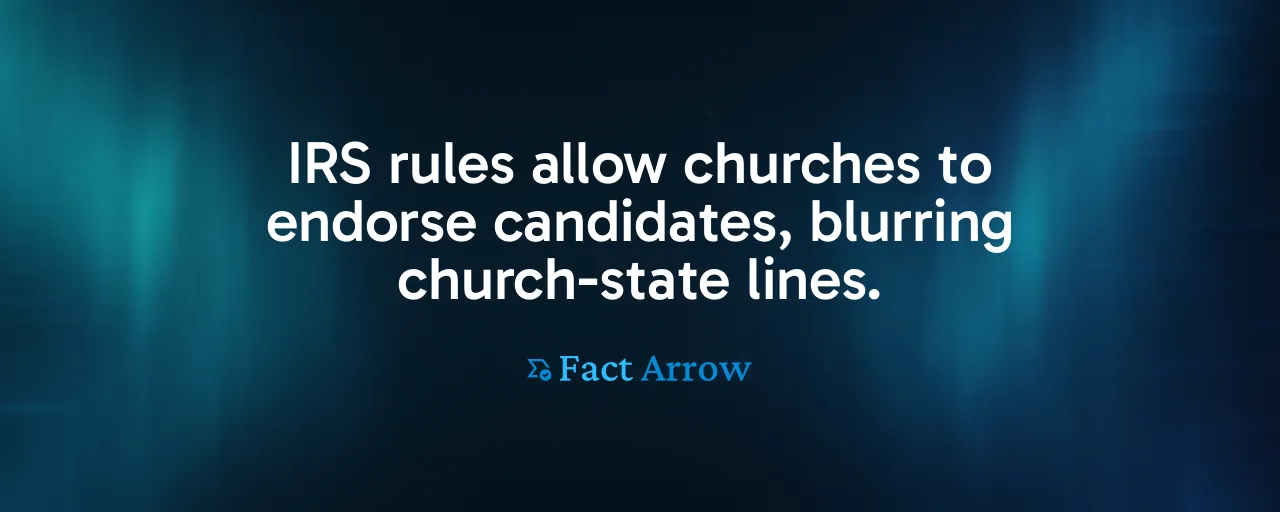A New Threat to Sacred Spaces
President Donald Trump recently celebrated a shift in tax rules, declaring his support for churches endorsing political candidates. The Internal Revenue Service, in a July 2025 filing, proposed that such endorsements, when tied to religious services, do not violate the Johnson Amendment, a 1954 law barring tax-exempt groups from campaign involvement. This change, stemming from a lawsuit by religious broadcasters, has reignited a fierce debate over the role of faith in politics.
For many, this feels like a dangerous step. Houses of worship, long seen as sanctuaries for reflection and community, risk becoming battlegrounds for partisan fights. The move threatens to blur the line between spiritual guidance and political campaigning, raising questions about fairness, transparency, and the integrity of religious institutions.
Most Americans, across faiths and political leanings, want churches to stay above the fray. Surveys show a clear preference for keeping pulpits free of candidate endorsements, reflecting a shared belief that faith should unite, not divide. This new policy could pull congregations into the messy world of electoral politics, where money and power often overshadow principle.
The stakes are high. If churches start acting like political action committees, they could lose the trust that makes them vital to communities. Worse, the tax exemptions they enjoy, funded by all taxpayers, might subsidize partisan agendas, undermining the democratic process.
The discussion ahead highlights why protecting the church-state divide matters, how the public views this shift, and what can be done to preserve the sanctity of faith while ensuring fairness in our elections.
Why Tax Exemptions Demand Neutrality
Tax-exempt status is a privilege granted to organizations serving the public good, rather than an inherent right. Churches, mosques, synagogues, and other faith groups benefit from this status, saving billions annually. In return, they agree to avoid partisan politicking, a rule codified by the Johnson Amendment to keep public subsidies out of campaign war chests.
When churches endorse candidates, they risk turning sanctuaries into megaphones for specific campaigns. Unlike political groups, these institutions don't have to disclose donors, creating a loophole for untraceable money to influence elections. Research from the National Council of Nonprofits warns this could open the floodgates to dark money, where wealthy donors or even foreign entities funnel cash through houses of worship.
Historical cases highlight the danger. In 1995, a church lost its tax-exempt status after endorsing a candidate, a rare enforcement of the Johnson Amendment. Such scandals erode confidence in faith institutions, making them seem like extensions of political machines rather than moral guides.
Public sentiment backs this concern. Polls from 2017 and 2023 show about 75 percent of adults, including many religious conservatives, oppose pulpit endorsements. People value churches as places for spiritual growth, separate from platforms for picking winners in elections.
The Public's Call for Separation
Congregations are diverse, often spanning political spectrums. When a pastor endorses a candidate, it can alienate members who disagree, fracturing communities built on shared faith. This polarization risks driving people away from worship, especially in an era when trust in institutions is already fragile.
Minority faiths face unique challenges. Megachurches, with vast resources, could dominate political messaging, sidelining smaller congregations like those of Muslim, Jewish, or Hindu communities. This imbalance threatens to amplify one group's voice while marginalizing others, skewing the democratic process.
Beyond congregations, the broader public worries about fairness. Taxpayers, regardless of belief, fund the exemptions churches enjoy. If those exemptions support partisan campaigns, it creates an uneven playing field, where secular nonprofits face stricter rules while faith groups gain unchecked influence.
Historical Lessons on Faith and Politics
Faith has long shaped American politics, from colonial sermons fueling revolution to pastors leading the abolitionist charge. In the civil rights era, clergy like Martin Luther King Jr. used pulpits to advocate for justice and champion moral causes, rather than endorsing candidates. These movements succeeded because they appealed to universal values, distinct from partisan loyalties.
The Johnson Amendment, introduced in 1954 by then-Senator Lyndon Johnson, aimed to prevent nonprofits from becoming political weapons. Its rare enforcement, with only one church penalized in 70 years, shows its restraint. Its existence has helped maintain a delicate balance, ensuring faith groups influence society without becoming campaign tools.
Solutions to Protect Faith and Fairness
To address this challenge, policymakers can strengthen transparency. Requiring churches that endorse candidates to file financial disclosures, like other nonprofits, would ensure accountability without curbing speech. This approach respects religious freedom while closing loopholes for undisclosed donations.
Another option is stricter enforcement of existing rules. The IRS could clarify that repeated violations lead to loss of tax-exempt status, deterring faith groups from crossing into campaign territory. Comparative research from other democracies shows that separating charitable status from partisan activity preserves public trust in both faith and government.
Preserving Trust in Sacred Spaces
The IRS's recent move, while narrow, sets a precedent that could reshape how faith intersects with politics. Protecting the church-state divide ensures houses of worship remain places of unity, not division. This approach aims to safeguard sacred spaces, rather than silencing clergy.
Americans value the moral voice of faith communities, but they reject the idea of pulpits as campaign stages. By prioritizing accountability and fairness, we can honor the role of religion in public life while keeping elections free from undue influence.
As this debate unfolds, the focus needs to remain on what unites us: a commitment to democracy and the sanctity of belief. Faith inspires, rather than divides, and our policies need to reflect that shared ideal.
